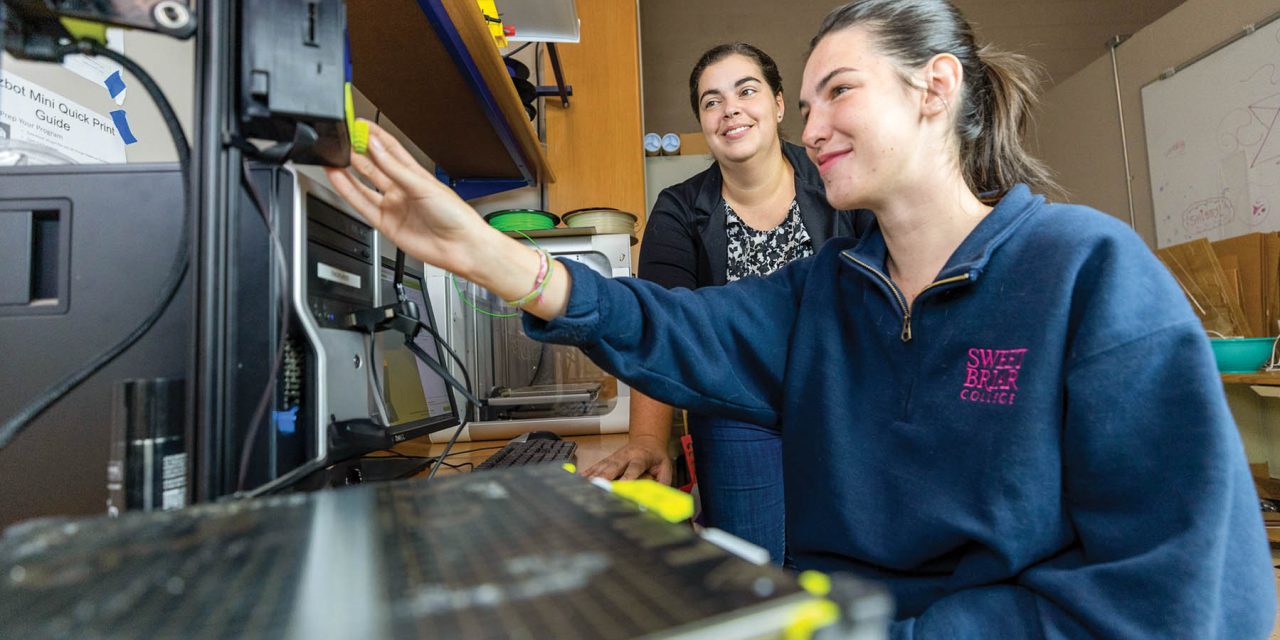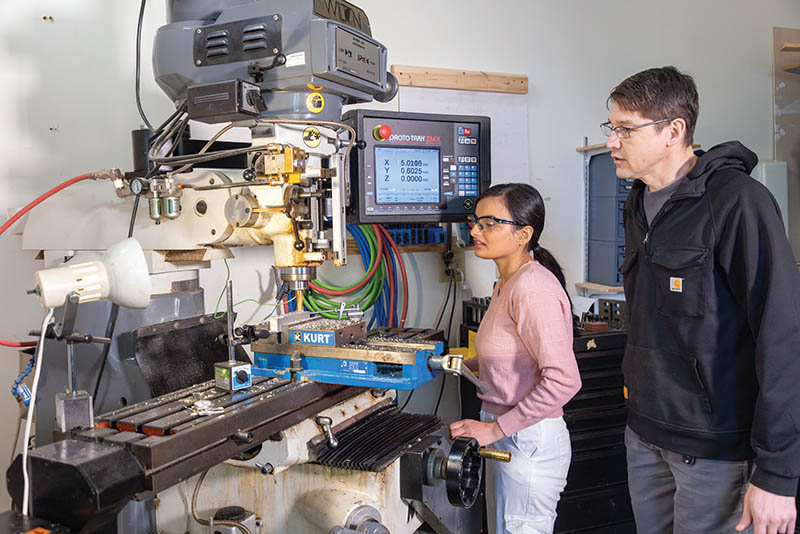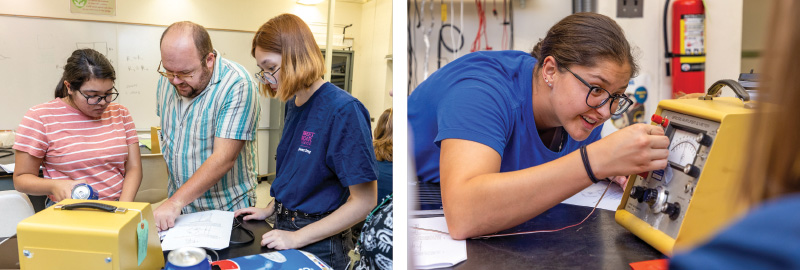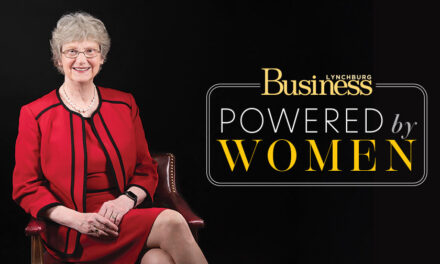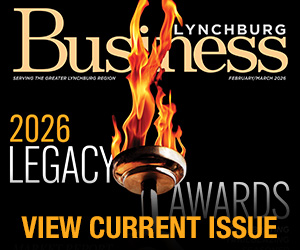Sweet Briar’s Broad-Based Engineering Degree Meets Industry Needs
By: Anna Eileen White | Photos Courtesy: Sweet Briar College
Despite an increasingly specialized engineering landscape, broad skill sets are in surprisingly high demand. While many undergraduate engineering programs major in single disciplines, preparing graduates for specialized fields such as mechanical or aerospace engineering, Sweet Briar College takes a different approach.
Their ABET-accredited bachelor’s degree in engineering science is a non-discipline–specific program that prepares uniquely versatile graduates who bridge engineering gaps with in-demand skills. Graduates rave about the advantages of the program’s small class sizes, career mentorship opportunities, and all-woman distinctives. The program’s rigor is reflected in exceptional hiring rates and placements with employers such as NASA, Whirlpool, Dominion Energy, and the U.S Navy.
Michelle Gervasio, Assistant Professor of Engineering at Sweet Briar College, says that graduates of the program are “an economical choice” for employers because they possess junior-level competency in mechanical, electrical, and civil engineering.
“There is no such thing as a single-discipline engineering problem anymore,” Gervasio explained. “Think of an everyday object like a washing machine—there are electrical components, mechanical components, computer coding; there are all sorts of things wrapped up in that one product. A student from Sweet Briar is able to work in all of those disciplines because they have fundamentals in all of those disciplines.” While employers could hire both a mechanical and electrical engineer to work on such projects, Gervasio says, “Just hire one Sweet Briar student!”
The demand for versatility and adaptability in engineering fields goes beyond head knowledge, and Sweet Briar has crafted a meticulous infrastructure providing students with invaluable opportunities and resources, whether academic- or career-oriented. From a curated closet of business attire that students can rent for free before job interviews, to annual, all-expenses-paid trips to the Society of Women Engineers conference, to hands-on learning with high-tech lab equipment like scanning electron microscopes, resources abound.
“There’s always something to do hands-on every year,” said Gervasio. “Our curriculum is incredibly designed and project-focused.”
Projects begin in the first semester when students build and race a cardboard boat. Next, they design a completely functional pinball machine using Arduino—an open-source electronic prototyping platform and circuits—learning how to make detailed dimension drawings and creating all the mechanical components from scratch.
They also spend time in the shop, working and communicating with the staff machinist as they would on a jobsite.
Every subsequent year includes a design project, which eventually culminates in a capstone project. “What makes our capstone unique from other institutions is that we use actual external clients,” Gervasio shared. “It’s not just some project that we invent for the students. It’s a real client needing a real engineering solution.” Students, working as teams or individuals, go on to present their capstones at SIEDS (Systems and Information Engineering Design Symposium) at UVA. In 2025, two Sweet Briar projects were Best Paper Award winners.
As a graduation requirement, students must also participate in a summer research program, which can be fulfilled either as an internship or a research project. Recently, some students have studied the coagulation of microplastics in wastewater. Another surveyed water pipes on campus and developed a system to detect leaks in the pipes using ultrasonic sensors, eventually turning that research into her senior honors thesis. Others, like Ana Patina, go for internships, which eventually lead to job offers.
Patina, who came to Sweet Briar from Columbia, wanted to study engineering through an accredited program, while continuing to play tennis. “It was pretty special that I found out about Sweet Briar,” she explained. “It’s an absolutely perfect program.” She played tennis all four years and praised the school for its exceptional balance of sports and academics.
After her internship and graduation, she began working for Altavista Instruments & Controls as an Electrical Engineer 1 and Automation Specialist. “She was a fantastic student, one of the best I’ve seen,” Gervasio said, adding that she wasn’t surprised when Patina got the job. “Over the past three years, we’ve had 100 percent placement with graduating seniors. I think within three months of graduation, they’ve all had jobs or acceptances into graduate school.”
Day to day, Patina now finds herself in constantly changing environments, absorbing new information on the go. “This past week I worked at Homestead Creamery and Abbot,” she explained, “The logic and the language in each place is very different and exposes you to all kinds of things. If I had chosen a different job I think it would have been more stagnant in the way of learning.”
She said it wasn’t only Sweet Briar’s non-discipline–specific degree program that helped her learn to troubleshoot in new environments, it was their teaching philosophy, “They focus on teaching you how to think and how to learn,” she explained.
Gervasio says when students leave this environment, they’re more comfortable navigating ambiguity at work. “With any job, you’re not going to learn everything you need to know in college, you’re going to need some training on the job,” she said. “But I think students who are used to going through the process of encountering unfamiliar situations and then using their engineering foundations and their troubleshooting skills are more comfortable navigating new situations.”
Patina reflected on the benefits of learning alongside female classmates, stating, “I would never have been able to speak up in a male-dominated field without the experience of Sweet Briar.” She said that if given the opportunity to choose a school again she would “definitely choose Sweet Briar 100 times over. That has never been a question for me.”
“That environment is conducive to gaining confidence and lessening the feelings of impostor syndrome,” said Gervasio. “But I’d say the biggest thing is that students can come here and they don’t have to be afraid if it’s their first time using a drill press or if they’ve never worked on a car before. Everyone is in the same boat. It’s ok, we’ll teach you.”

